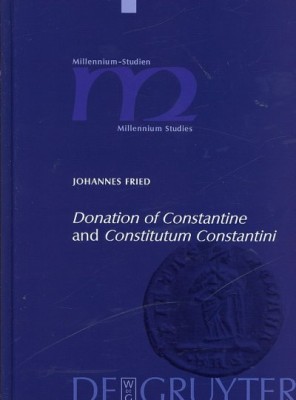| "Donation of Constantine" and "Constitutum Constantini" Contributor(s): Fried, Johannes (Author) |
|
 |
ISBN: 3110185393 ISBN-13: 9783110185393 Publisher: de Gruyter OUR PRICE: $125.72 Product Type: Hardcover - Other Formats Published: June 2007 Annotation: The Donation of Constantine is the most outrageous and powerful forgery in world history. The question of its precise time of origin alone kept generations of researchers occupied. But, what exactly is the Donation of Constantine? To find the answer, it is necessary to approach the question on two different semantic levels: First, as the Constitutum Constantini, a fictitious privilege, in which, among other things, rights and presents were bestowed on the catholic church by a grateful Emperor Konstantin. Secondly, as a reflection of the Middle Age mindset, becoming part of the culture landscape midway through 11th century A.D. The author not only reinterprets the origin of this forgery (i.e. puts it down to the Franks' opposition of Emperor Louis the Pious), but retells, as well, the history of its misinterpretation since the High Middle Ages. In an appendix, all relevant texts are printed in the original language, an English translation is provided. |
| Additional Information |
| BISAC Categories: - History | Ancient - General - History | Social History - History | Europe - Medieval |
| Dewey: 262.132 |
| Series: Millennium Studies |
| Physical Information: 0.63" H x 7.02" W x 9.58" (1.07 lbs) 201 pages |
| Themes: - Chronological Period - Ancient (To 499 A.D.) - Chronological Period - Medieval (500-1453) |
| Descriptions, Reviews, Etc. |
| Publisher Description: The Donation of Constantine is the most outrageous and powerful forgery in world history. The question of its precise time of origin alone kept generations of researchers occupied. But, what exactly is the Donation of Constantine? To find the answer, it is necessary to approach the question on two different semantic levels: First, as the Constitutum Constantini, a fictitious privilege, in which, among other things, rights and presents were bestowed on the catholic church by a grateful Emperor Konstantin. Secondly, as a reflection of the Middle Age mindset, becoming part of the culture landscape midway through 11th century A.D. The author not only reinterprets the origin of this forgery (i.e. puts it down to the Franks' opposition of Emperor Louis the Pious), but retells, as well, the history of its misinterpretation since the High Middle Ages. In an appendix, all relevant texts are printed in the original language, an English translation is provided. |